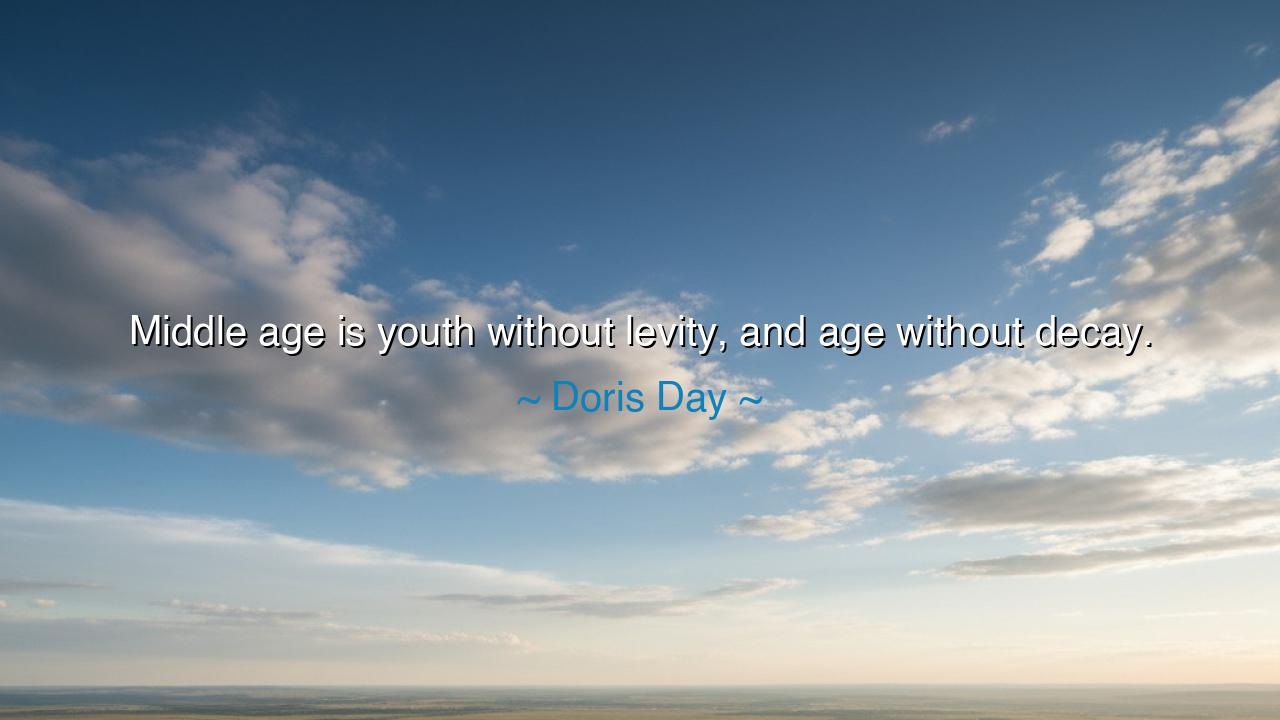
Middle age is youth without levity, and age without decay.






"Middle age is youth without levity, and age without decay." These words by Doris Day offer a profound reflection on the transitory nature of life. In a single, succinct statement, she captures the essence of middle age as a phase that exists between two defining periods—youth and old age—neither fully one nor the other. Middle age, according to Day, holds the strength and wisdom of maturity, but without the carefree lightness of youth. At the same time, it is not burdened by the decay that often accompanies old age. It is a liminal space—a period where one has the stability of experience but still retains a degree of vitality that comes with youthful energy.
In the wisdom of the ancients, such a middle phase of life was recognized as a precious time. The Greek philosopher Aristotle spoke of the "golden mean," the ideal balance between excess and deficiency. For Aristotle, the middle stage of life was the time when one’s character was fully formed, yet there was still time to act with vigor and purpose, to pursue virtue and self-improvement without the impulsiveness of youth or the limitations of age. Middle age, in this light, was seen as a time of maturity, when one could apply the lessons learned from earlier years to lead a life of balance and wisdom.
Take, for example, the life of Julius Caesar. In his middle years, Caesar was not the impetuous young general, nor the frail old man that would eventually fall to assassins. In his middle age, he was at the height of his powers—having gained immense wisdom from his earlier experiences and yet still possessing the drive and strength to conquer and lead. The strategic prowess and diplomatic skill he honed in his middle years are the very traits that secured his place in history. In this sense, Caesar embodies the essence of middle age as Doris Day describes it—youth without levity, and age without decay.
Similarly, the Roman Emperor Marcus Aurelius is a model of this middle stage of life, where the wisdom of old age meets the strength of youth. Aurelius, even as he grew older, continued to lead with remarkable clarity and self-discipline, as seen in his Meditations, where he reflected on how best to live a life of virtue. He did not decay into resignation, nor did he allow his energies to fade. Instead, he embraced the opportunity to grow spiritually and emotionally, to balance his inner peace with the external duties of leadership. In his mature years, he found a harmony that Doris Day captures so well—youth's fire tempered by age's clarity.
Yet middle age is not just about physical vitality or accumulated wisdom—it is also a time of reflection and revaluation. As Day suggests, middle age lacks the levity of youth, the carefreeness that often accompanies the early years of life. In youth, we are often driven by idealism, ambition, and an innate desire for freedom. But by the time we reach middle age, we are often more grounded, aware of the complexities of life, and weighed by responsibilities. This transition, while sometimes difficult, offers an invaluable opportunity for growth—a time to look inward, evaluate what we have achieved, and set new goals that reflect the wisdom of our experiences.
In modern times, we see examples of individuals who embody this balance between youthful energy and aged wisdom. Maya Angelou, the celebrated poet and author, found the peak of her creative power in her middle years, after having lived through the struggles of youth and the challenges of early adulthood. She wrote her most famous works when she was in her forties and fifties, proving that middle age can be a time of immense creativity and personal flourishing. Her work demonstrates that middle age is not a time of decay, but one of revelation and expression, where the lessons of youth and the wisdom of age combine to form something beautiful.
Thus, the lesson Doris Day’s quote imparts is not one of resignation, but of acceptance and balance. Middle age is a gift, a time when one is equipped with both the strength and the wisdom to make the most of the years ahead. It is a time when we can look back with gratitude for what we’ve learned and move forward with purpose, guided by the wisdom we’ve gained. Rather than bemoan the loss of youth, we must embrace the opportunities of this period—seeking new paths for growth, for learning, and for connection. It is the perfect time to apply what we’ve learned, not just for personal success, but for the betterment of those around us.
In practical terms, we should strive to keep our bodies strong through exercise, our minds sharp through study, and our hearts open through love and connection. Middle age, as Day suggests, is not the end of vitality but the beginning of a new chapter in which we can continue to contribute to the world, growing not just older, but wiser, more fulfilled, and more at peace.






AAdministratorAdministrator
Welcome, honored guests. Please leave a comment, we will respond soon